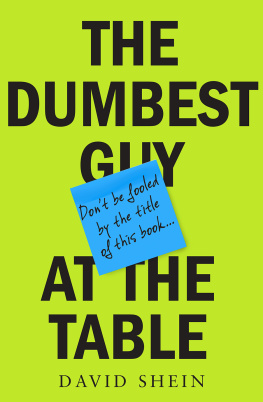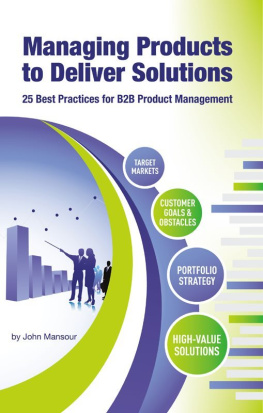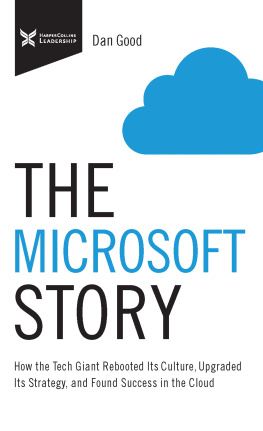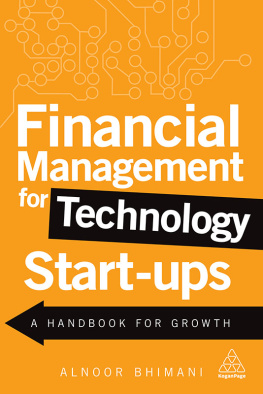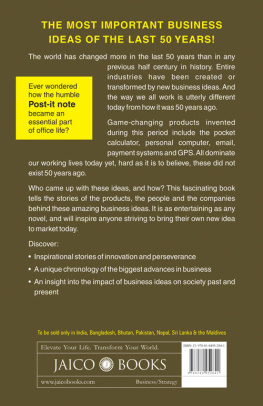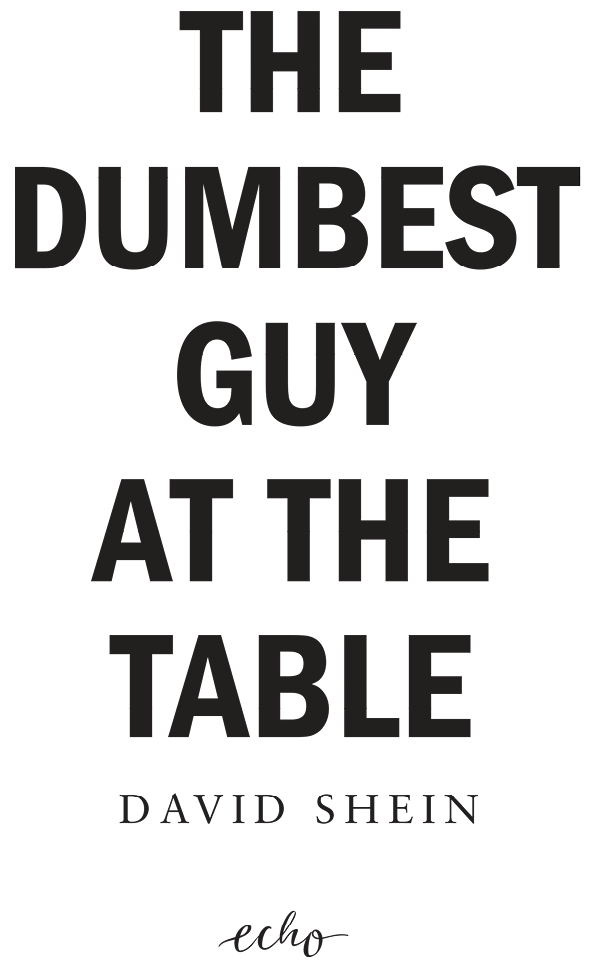Dedication
This book is dedicated to my good friend and work colleague Dan Jarzin, who tragically passed away, much too young, on 10 August 2005.
To everyone, Dan was this good-looking, world-class financial controller, an amazing Iron Man triathlete with a beautiful wife, Mary, and two adorable kids he had everything. Unfortunately, Dan did not see what everyone else did, and he succumbed to his illness. In memory of Dan, 100 per cent of the royalties received by the author on book sales will be donated to the Black Dog Institute, www.blackdoginstitute.org.au.
Dan was the third person to join Com Tech, although he left after six months to join a more established company. He returned as our CFO and made a massive contribution to Com Tech. Dan, you always told me to write a book it took me more than 20 years, but finally I have taken your advice.
Foreword
by Ian Chappell
David Shein wasnt always the dumbest guy at the table; I attended a lot of board meetings he convened.
I first met David in 1966 when I was invited to the Shein home in Johannesburg by his father, Martin. The first in a family full of accountants, Martin was head of the Dugson clothing company in Johannesburg, which generously supplied the touring Australian cricket team with blazers and other assorted apparel.
Little did I know that when I allowed myself to be bowled by this six-year-old South African kid in a pick-up game in his fathers backyard it would be one of my lucky breaks in life. I couldnt help adding allowed myself to be bowled, because for too long David Shein has laboured under the misapprehension that he genuinely beat my forward defensive shot.
This was in 1966. If David had bowled me in his fathers backyard in 1970 then it wouldve been a genuine dismissal. My second tour of South Africa was so calamitous that I would have been eager to score runs even in a Whiteley Road backyard.
Meeting Martin in 1966 began a long and happy relationship with the Shein family that has endured until the present.
Our families have a lot in common. They both consist of three boys, an influential mother and a strong-willed father named Martin. When the two fathers met at The Oval in London in 1972, it was the first occasion that brothers Greg and myself made centuries on the same day of a Test. To celebrate, father Shein said to father Chappell: Ill send you a suit via one of the boys when they visit South Africa at the end of the tour.
True to his word, I carried home a suit for Dad that fitted him perfectly, judged purely on that face-to-face meeting at The Oval.
That tells you two things about the male Sheins: they are men of their word and they have a sharp eye for detail.
Those qualities were evident in the way Com Tech and then later DiData was run.
When the boys started arriving in Sydney in the 1980s, my wife Barbara-Ann and I often caught up with them socially. Once David started Com Tech in 1987 I gradually became involved with the business, occasionally addressing the staff, helping to organise current and ex-cricketers to play in their client golf days and eventually serving on the board.
Apart from enjoying myself immensely, I learnt a lot about business and the way David conducted operations. He, along with brothers Jon and Steven, ran a highly successful business by applying some very simple rules.
Id always been of the strong belief that the same principles that apply to running a successful sporting team also work well in both business and life.
Applying common sense is an important part of any successful venture, and David has always valued that ingredient.
Reading through his book, the things that stand out about his business life are all lessons I learnt during my cricket career.
For example you always learn more from your losses than your wins. As a leader it pays to empower the people under you because, in the case of a cricket team, eleven heads are better than one. Winning at any cost is not a victory, but succeeding while maintaining integrity ensures long-term fulfilment.
I always advised young cricketers to choose the bat they liked, not the one that paid the highest royalties. It generally follows that if you perform well, the money takes care of itself.
As a captain I had a saying about the way you treat players: Praise in public and castigate in private.
Davids thoughtful treatment of staff is legendary, and that is why he still maintains contact with a number of the people who worked under him during both the Com Tech and DiData period. He also applied a similar approach with clients, and I have no doubt it was a trait that sealed many important partnerships, particularly in those crucial early days of Com Tech.
Hes also believed in a balance between mixing business with relaxation. There was no better example of this than the famous forums that were held at Hyatt Coolum. The idea of having the IT industry gather under one roof and deliver presentations on products old and new, was one of pure genius. However, the sun going down wasnt the end of proceedings and the entertainment that followed was of a similar high quality to the presentations delivered during the day.
To listen to the wonderful singing voice of Kate Ceberano or be amused by the humour of Danny McMaster was an absolute pleasure. Nevertheless, my favourite act was the truly amazing Chinese gymnasts who were masterfully introduced with the succinct statement: These guys do some really sick shit.
The performers who followed were brilliant and fully lived up to the introduction.
As a businessman, David Shein has lived up to his ideals. Dont be fooled by the title of this book; this guy really knows his shit.
[br]
Ian Chappell
Australian Cricket Captain, 19711975
Preface
by David Shein
Two decades after selling the company that I founded, Com Tech Communications, for an enterprise value of over $1 billion arguably Australias first tech unicorn I decided to write a book.
Hopefully the lessons provided in this book will provide valuable advice to anyone looking to start a company. One of the benefits of turning 60 back in 2020 is that I have been around long enough to see products come and go. But what hasnt changed is that every company still has staff, customers and business partners. I firmly believe that the way you treat these three constituents will determine whether you build a good company, a great company or one that simply disappears.
While achieving financial success has been a great outcome for myself and my family, there are so many other fulfilling outcomes of building a successful company. Seeing people, including myself, achieve way more professionally than they ever thought possible; seeing staff members who helped to build the company share in the success of the company; and, importantly, that feeling of being part of a phenomenal team that achieved something great we would all have done anything for each other.
One of the two greatest compliments that I received after selling Com Tech came from Bob Dwyer, Australian Rugby World Cup winning coach and Com Tech board member, who said: Dave, you taught me that you dont have to be an asshole to build a successful company. The other came from my best friend and founder of Nandos (the worlds best chicken), Robbie Brozin, who told me: Dave, youre still the same guy that you were when you left South Africa in 1986 you havent changed.
While I achieved more than I ever dreamed I was capable of, it pales into insignificance when you compare it with the success of the next generation of founders companies like SEEK, carsales.com and REA. But then, the third generation of founders have truly shown what this country is capable of delivering to the world. Scott and Mike from Atlassian, Mel and Cliff from Canva, Larry and Pete from Zip, Nick and Anthony from Afterpay and all the rest have proven that Australia has emerged as an innovation powerhouse.

